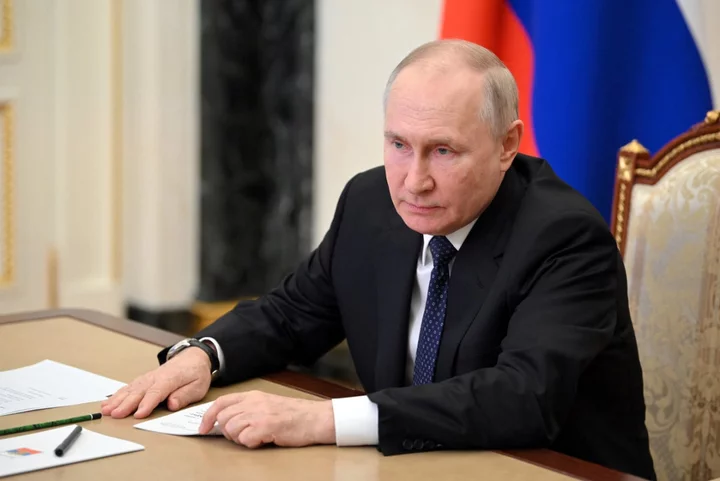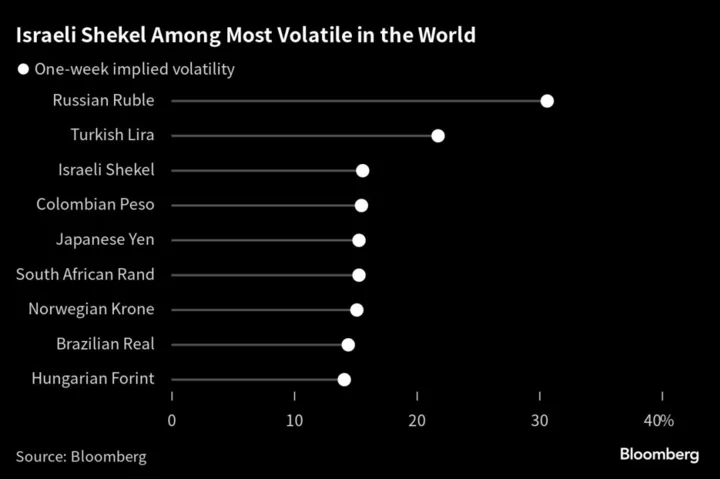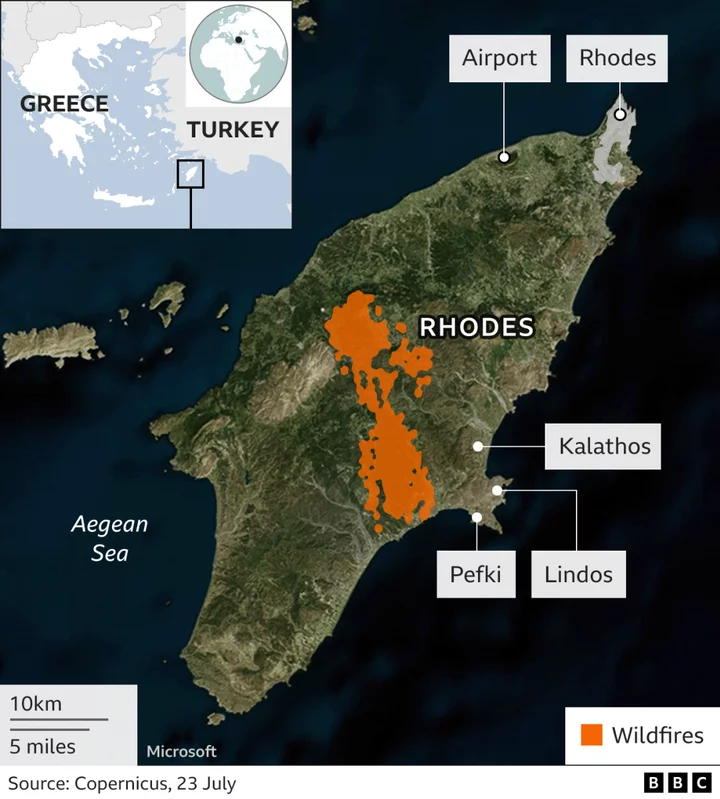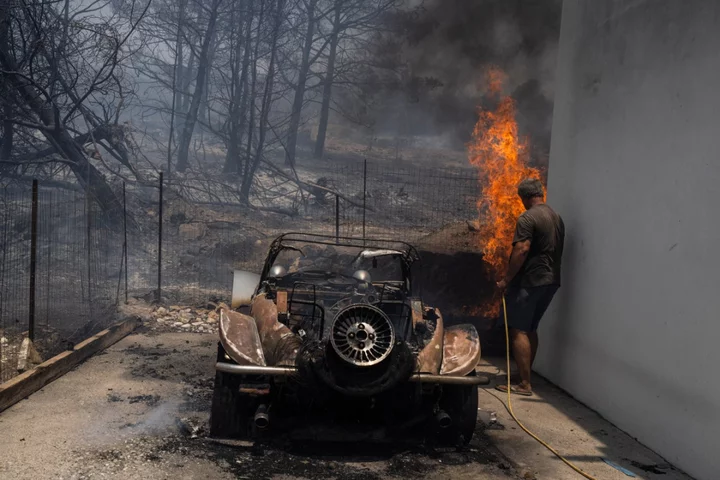
Savers Value Village Wins Over Wall Street as Analysts See Growth Potential of Thrifting
Thrift shopping is hot and after a successful trading debut Wall Street analysts are telling investors to scoop
2023-07-25 20:28

Putin signs off law banning Russians from changing gender in latest blow to LGBT+ community
Vladimir Putin has signed a new controversial legislation banning surgical gender reassignment in Russia in yet another blow to the country’s LGBT+ population. Crackdowns against the LGBT+ community and gender minorities in the country have only gathered pace ever since the full-scale invasion of Ukraine last year as the Russian president seeks popularity among citizens. The latest move by Mr Putin on Monday marks Russia’s final step in rendering gender-affirming procedures illegal and depriving its transgender population of their right to access gender-reassignment services. The bill, cleared unanimously by both houses of the Russian parliament and signed by Mr Putin, now bans any “medical interventions aimed at changing the sex of a person” along with changing one’s gender in official documents and public records. Under the bill, exceptions will only be made for a permissible list of medical interventions “related to the treatment of congenital physiological anomalies in children”. The list of these “anomalies in children” will be drawn up by the Kremlin. Couples who transitioned to their new genders after they adopted children will have their marriages annulled. The law thus bans them from becoming foster parents. The regressive legislation has stemmed from the Kremlin’s crusade to protect what it calls are the country’s “traditional values” and according to Russian lawmakers, it is meant as a safeguard against “Western anti-family ideology”. Some lawmakers have dubbed gender transitioning “pure satanism”. State Duma speaker Vyacheslav Volodin said the decision to pass the bill “will protect our citizens and our children” after it was set to undergo its third reading. The bill described gender reassignment as “the path leading to the degeneration of the nation”. The future remains bleak for Russia’s transgender population, which earlier had access to gender-reassignment surgeries and treatments like hormone replacement therapy. A transgender man in Russia, identified as Alexei, said he always had plans to change the gender label on his passport, but is now enduring “hell”. The 23-year-old told The Moscow Times that he is in panic, while stating that the process of his gender transition was already lagging as he was living on his own since he turned 18. He also told the newspaper that he did not have enough money, but will now have to start urgently. Russia ranked 46 out of 49 European nations in advocacy group Rainbow Europe’s annual LGBT+ rights rankings. The country’s politicians are “harming transgender and intersex people by continuing to deploy cynical ‘family values’,” according to Human Rights Watch. Read More Russian president signs legislation marking the final step outlawing gender-affirming procedures The upper house of Russian parliament approves a ban on gender changes Russian lawmakers pass a bill outlawing gender-affirming procedures to protect 'traditional values' Parents take on struggle for trans rights for their kids and others in conservative Poland Spain votes in general election that could see it become latest EU country to veer to the right
2023-07-25 20:21

Caesars and PointsBet Promo Codes: $1,750 Bonus For ANY World Cup or MLB Game!
FanSided readers have exclusive access to a pair of fantastic promo codes from Caesars and PointsBet that'll net you up to $1,750 in bonuses for ANY World Cup or MLB game! It only takes a few minutes to claim each offer, too.See below how to access these bonuses and set yourself up for a MA...
2023-07-25 19:28

Thai Political Gridlock Grows as Pro-Democracy Bloc Wobbles
Thailand’s parliament called off a vote to select a new prime minister scheduled for Thursday as a coalition
2023-07-25 19:18

Roundup: Tori Kelly Rushed to Hospital; C.J. Stroud, Anthony Richardson Sign Contracts; Raiders Sign Marcus Peters
Tori Kelly rushed to the hospital, C.J. Stroud and Anthony Richardson signed rookie contracts, the Raiders signed Marcus Peters and more in the Roundup.
2023-07-25 19:18

Israeli Assets Slump as Investors Mull Judiciary Overhaul
Israeli assets declined Tuesday as investors mulled a law passed in parliament that will weaken the power of
2023-07-25 18:25

Buffett Lifts Fossil Fuel Bets as Global ESG Push Mints Bargains
Warren Buffett’s multibillion-dollar purchases of oil and gas investments early in the pandemic paid off when the sector
2023-07-25 17:59

Watch: Jill Biden meets France’s first lady to celebrate US rejoining Unesco
Jill Biden met France’s first lady Brigitte Macron on Tuesday, 25 July, as she visited Paris to mark the United States’ official re-entry into United Nations Educational, Scientific and Cultural Organisation (Unesco). The US First Lady will attend a flag-raising ceremony to celebrate the re-entry into the agency after a five-year hiatus. She is expected to make a speech about the importance of American leadership in preserving cultural heritage. Under Donald Trump’s administration, the US pulled out of Unesco because of an alleged anti-Israel bias and a need for “fundamental reform” in the agency. It was the second time the US returned to Unesco after withdrawing, after previously leaving under Ronald Reagan’s administration in 1984 citing alleged advancement of Soviet interests, mismanagement, and corruption. The nation announced its intention to rejoin the agency in June 2023 before the agency’s 193 member states approved re-entry. Today’s ceremony will feature a speecy by Unesco’s director general Audrey Azoulay. Read More First Lady Jill Biden to mark US reentry into UNESCO with flag-raising ceremony in Paris Oui, oui: Jill Biden heads to Paris to help mark US return to UN educational and scientific agency Jill Biden welcomes proposal for Medicare to pay for navigation services for cancer patients
2023-07-25 17:47

Rhodes: First flights taking NI tourists from wildfires due later
EasyJet and Jet2 flights carrying passengers from areas affected by wildfires will touch down tonight.
2023-07-25 17:29

Binance to Scale Up Services on New Japan Platform in August
Binance will roll out full services on its new platform for Japan in August, the crypto exchange’s founder
2023-07-25 17:25

Russia-Ukraine war – live: Putin launches fresh drone strikes on Kyiv as air raid sirens wail across capital
Russia launched a fresh wave of drone strikes on Kyiv and other parts of the country early on Tuesday morning, Ukraine has said. The Kremlin used Iranian-made Shahed drones to attack Kyiv for the sixth time this month, but all were shot down, Serhiy Popko, head of the Kyiv military administration, said. Air raid sirens wailed across the capital and attacks were also reported in the north and centre of Ukraine but none in the south. There were no immediate reports of casualties or damage to buildings. Air force spokesperson Yuriy Ihnat said air defences had been engaged in three regions in the north of the country. “About 10 drones were recorded, the information is being clarified,” he told Ukrainian television, adding that up to five were destroyed. Earlier, thousands of Wagner group mercenaries have arrived in Belarus since the group’s short-lived rebellion, a military monitoring group said. Between 3,450 and 3,650 soldiers have travelled to a camp close to Asipovichy, a town 230 kilometres (140 miles) north of the Ukrainian border, according to Belaruski Hajun, an activist group that tracks troop movements within the country. Read More Who is Yevgeny Prigozhin? The Wagner Group mercenary chief who rebelled against Putin Monitoring group says thousands of Wagner mercenaries have arrived in Belarus since failed uprising Wagner mercenaries training Belarus special forces just miles from border with Nato-member Poland
2023-07-25 17:17

How long will the wildfires last in Greece?
Evacuations are set to continue in Greece as Corfu and Evia have become the latest Islands to issue orders while the country grapples with the devastating wildfires. The Greek fire service has said around 2,500 people have evacuated from Corfu so far. Thousands of people have also been forced to leave their homes and hotels - with those in Santa, Megoula, Porta, Palia Perithia and Sinies being told to evacuate to Kassiopi. A spokesperson from the Met Office told The Independent: “Temperatures on Rhodes are likely to peak on Wednesday, and could be close to 39C in some spots. Temperatures are then expected to move back towards average for the time of year later in the week, likely around 30C. “However, windy conditions could impact efforts this week. There are some northwesterly winds today, with these likely to ease on Tuesday and Wednesday. “However, a return of windy weather is possible later in the week, albeit accompanied by that drop in temperatures,” the Met Office added. What will the weather be like this week in Greece? According to the Met Office website, the temperature in Rhodes will be as follows: Monday 24 July - Highest temperature: 36C and Lowest: 31C Tuesday 25 July - Highest: 37C and Lowest: 28C Wednesday 26 July - Highest: 39C and Lowest: 27C Thursday 27 July - Highest: 36C and Lowest: 23C Friday 28 July - Highest: 34C and Lowest: 24C Saturday 29 July - Highest: 32C and Lowest: 22C Sunday 30 July- Highest: 33C and Lowest: 24C How long will the wildfires last? The climate crisis is increasing the risk of larger, more intense and erratic wildfires around the world due to hotter and drier conditions. Other factors also play a role including soil moisture levels, and the presence of vegetation which acts as fuel for fires. “It’s important to note that these wildfires are happening in environments that are naturally prone to fire during hot and dry summers, with vegetation that is highly adapted to live with fire”, Dr Matthew Jones, NERC Independent Research Fellow, Tyndall Centre for Climate Change Research, School of Environmental Sciences, UEA, said in a statement. Dr Jones added that under climate change and frequent changes to weather conditions across the globe, fires are more likely to break out and “also burn so intensely and synchronously across the Mediterranean.” “The Mediterranean has seen a dramatic increase in the frequency of the hot-dry conditions that were considered extreme at the end of the last century, and these increases are expected to accelerate for each added degree of warming in future,” he noted. According to the Joint Research Centre, last year was the second-worst wildfire season in Europe. In 2022, damages exceeded those of 2021, as per data from the EFFIS - an advanced report on Forest Fires in Europe, the Middle East and North Africa. The EFFIS looked at fires in 45 countries and found that these places suffered from 16,941 fires that burnt 1,624,381 hectares. Looking at just European countries, July 2022 was the month when the most significant proportion of damage occurred in Spain, Portugal, France, Italy and Greece. According to Safer Scotland’s Wildfire Operational Guidance, a wildfire can burn for a “period of time” and this is heavily dependent on the landscape, which contributes to how fast the fire might move. The “behaviour” of the wildfire depends on the following factors: the area, its combustibility and arrangement, the arrangement of the area, the weather and time. Dependent on stable or unstable weather conditions the Wildfire Operational Guidance said time “can have a positive or negative effect on fire development throughout the day and this will bring both advantage and disadvantage to firefighting operations.” Space is another important factor as the area in which the fire is burning brings changes to the shape of the fire, altering the fire’s alignment. For example, as fire changes its location and moves across the area “topographical and climactic conditions will work for and against the first altering its intensity and speed.” What impacts does fuel have on wildfires? When a wildfire occurs, the main source of fuel is vegetation. This type of fuel, its size and the way the vegetation is arranged across the landscape will affect the way the fire burns. The Wildfire Operational Guidance has said the size and shape of the fuel are important especially “in regard to their ease of ignition. Smaller fuels, referred to as ‘fine fuels’, are more receptive to fire, while larger or more coarse fuel types generally rely on their interaction with fires in finer fuels before they will ignite.” Fine fuels are considered to be those with a diameter of up to 6mm, this includes grass, small stems and the leaves of low-lying shrubs. These fine fuels can also be found in large quantities in plants - such as needles on conifer trees. “Fuels that are over 6mm in diameter are described as ‘coarse fuel’ and include twigs, branches, and tree trunks,” the guidance has said. Fine fuels can affect the intensity of the fire, the rate and motion of the fire, the flame length, the fire activity and increased ignitions caused by spot fires. When asked about how long the wildfires might last in Greece, Jim Dale, founder and senior Meteorlogical Consultant at the British Weather Services told The Independent: “For as long as there is ‘fuel’ as in combustible brush. The wind is the enemy as far as people and infrastructure are concerned; there is no sign of rain. “The two main fire zones of Rhodes and Corfu will almost certainly be added to as the Mediterranean basin continues to bake with record and near-record temperatures.” Read More Greek fires ‘big warning’ for tourists to Mediterranean, says climate expert Greece fires – live: Corfu evacuations begin as tourists fleeing Rhodes inferno spend second night in airport Greece wildfires: Rhodes tourists sleep on airport floor awaiting evacuation
2023-07-25 16:55
